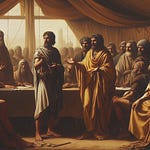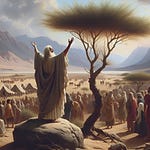Chapter Notes
It has been said by many over the centuries that man's extremity is God's opportunity.
In Exodus 6, God reassures a faltering Moses that He will perform precisely what He promised.
Commentary
vv. 1–8 - The previous chapter ended with Moses lamenting before God and essentially calling God into question. This chapter opens with God revealing to Moses that the Exodus will come about with Pharaoh exercising a "strong hand" to drive the Hebrews away from his presence. In other words, Pharaoh will be made to send the Hebrews away. Note how God did not offer answers to the questions or doubts His people had. He did not try to justify Himself to Moses. He simply repeated "I am Jehovah" in vv. 2, 6, and 7 and declared His promise to glorify Himself by delivering the Hebrews from Pharaoh. God then restates what He said in chapter 3. Perhaps you wonder what v. 3 means? The fact that the patriarchs did not know God by the name which conveys Him as the God who keeps covenant with His people is tied to the timing. Jehovah is used many times in Genesis, but God reveals the significance of this name when the time has come to fulfill more of what He had promised. Thus, following the remark that He remembered His covenant in v. 5, vv. 6–8 contain seven "I will" statements which reflect doctrines such as redemption, adoption, and possession which span various aspects of our salvation. The Bible tells us these promises are yea and Amen in Jesus Christ (2 Cor. 1:20). Seven is the number of perfection. God is making it clear that the time to fulfill His covenant obligations is now. The words "I am Jehovah" introduce and conclude God's promises to convey the idea that the performance of what God promised flows out of the very nature and character of God.
vv. 9–13 - With a sense of faith-filled optimism, Moses goes to the children of Israel to tell them what God said. With God’s repetitious "I will" statements, the Hebrews respond, "we won’t." The reason given is for "anguish of spirit, and for cruel bondage," i.e., they were out of breath from the work and troubled in their minds. Instead of making further appeals, God directs Moses to continue with the work of standing before Pharaoh. However, once again Moses is disappointed. If his stammering lips could not convince the Hebrews of God’s promises, how could they convince Pharaoh of God’s judgments? But the Lord seems to overlook the objection and insists that Moses and Aaron continue with their dual responsibilities to speak to Pharaoh and the children of Israel.
vv. 14–30 - We are given, not a complete genealogy, but one intended to support the lineage of Moses and Aaron. Who are these men who will play such a significant role in the development of Israel as a nation? Since all we know at this stage is that they are Levites, Moses sets Levi in his order after Reuben and Simeon, and then proceeds to do a number of things. First, he shows that the grace of God does not follow the natural order. The high position of the Levites is given to the third, not the firstborn or the second born, but the third born. Second, he shows that their father married their aunt, which would later be prohibited by the law. This diminishes any charge against Moses by those who might say the new laws of consanguinity are unfair. Third, he records their uncles and their first cousins, particularly because one of them, Korah, will lead a rebellion against Moses and Aaron. Moses then closes with a repetition of the historical context recorded just before the genealogy, which will naturally flow into the record of Exodus 7.
Application
God is not obliged to grant immediate results to immediate obedience. We often think God will do His part when we do ours, or imagine that instant results glorify God more than a gradual unfolding of His purpose. We think this way because we are trying to shape God according to our own will. This is wicked. We obey immediately, yes, but what comes of that is in God's hands and according to God's timing. Let us realize that our patience glorifies God also.
The character of God is the sum of our salvation. God wanted His people to understand that the answer to all their problems was to be found in Him. Every aspect of their salvation depended on His being and character. Salvation began with God because it all came from His grace, and it would end with God because it would all return to His glory. Whatever difficulties showed up in the meantime, God would be able to handle because He is the Lord! Rather than taking a vacation from our problems, therefore, the thing to do is to find rest and repose in the lordship of God. He is the answer to every difficulty.
Infirmities ought to humble us but not restrain us. Once again, the matter of Moses’ inability to speak is brought up. He did not possess the gift of utterance, and he knew it. However, God had already addressed this limitation and made it clear that, regardless of the inability, Moses was God's chosen instrument. It is good to be conscious of our weakness, but not if we use it to disobey the revealed will of God. When God speaks, we are obliged to obey. It's as simple as that.
Focus on the promised outcome, not the present setbacks. God encouraged Moses to look forward to the outcome when He said, “Now shalt thou see what I will do to Pharaoh.” In saying this, the Lord passes over intervening details, directing His servant to a certain victory. Christian, take this to heart. We defeat our sense of hope in Christ’s cause when we are occupied with present difficulties. Lift up your eyes. Can you not see the cloud the size of a man's hand? Do you not hear the trumpets of victory?
Ministers of God must have words for the children of God and the enemies of God. The French reformer, John Calvin, said, “The pastor ought to have two voices: one, for gathering the sheep; and another, for warding off and driving away wolves and thieves. The Scripture supplies him with the means of doing both.” You can see this in v. 13, where Moses and Aaron have a charge from God to speak to both categories. Pray for your pastor that he might rightly exercise this charge with wisdom, courage, and power. Those at odds with God ought to feel uncomfortable under the preached Word, while the humble ought to be led into deeper gospel comfort.
Christ is the uniquely qualified shepherd of the people of God. Psalm 77:20 says, “Thou leddest thy people like a flock by the hand of Moses and Aaron.” Despite all his learning, Moses could not lead the children of Israel on his own. And despite a more natural ability to speak, Aaron could not lead the people. In other words, though these men were great servants of God, their deficiencies proclaimed loudly that true deliverance must be brought by one greater than these two men combined. Dear friend, do not look to any but Jesus Christ. He alone is the good shepherd who can lead His people through the wilderness of life and be with us in the valley of the shadow of death. Believe Him, trust Him, and serve Him all the days of your life.
“The gist of this affirming was thus, “Israel is My son. You, Pharaoh, may call him your slave, but he is My child. He was Mine before he was yours. Israel is My son. You say, ‘No, he is my serf.’ I say, though he has fallen under your yoke, I will maintain My right to him as My firstborn. He is a prince and to that estate he shall be raised.” — Charles Spurgeon











